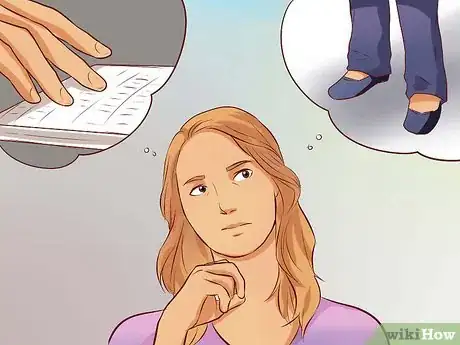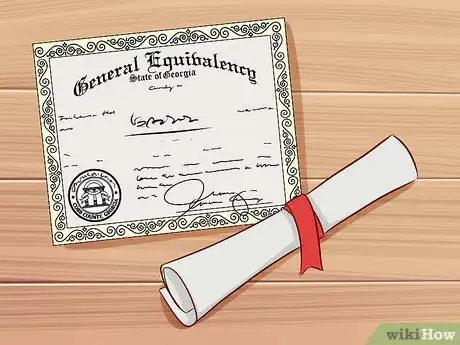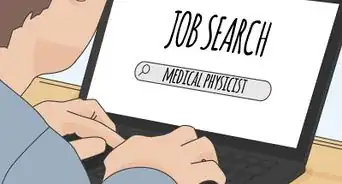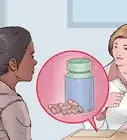wikiHow is a “wiki,” similar to Wikipedia, which means that many of our articles are co-written by multiple authors. To create this article, 11 people, some anonymous, worked to edit and improve it over time.
There are 7 references cited in this article, which can be found at the bottom of the page.
wikiHow marks an article as reader-approved once it receives enough positive feedback. In this case, 90% of readers who voted found the article helpful, earning it our reader-approved status.
This article has been viewed 236,972 times.
Learn more...
Are you looking for an entry level job in a pharmacy? Consider becoming an assistant pharmacist. You'll be responsible for dealing with customers, restocking the pharmacy, typing up prescriptions, and other clerical tasks. Unlike pharmacy technicians, assistant pharmacists don't need any special training, certification, or pharmaceutical knowledge. Job demand for assistant pharmacists is expected to grow to 11% by 2022.
Steps
Getting Education and Experience
-
1Consider the skills you'll need as an assistant pharmacist. Unlike pharmacists and technicians, assistant pharmacists mainly perform secretarial tasks and provide customer service. In addition, you should be accurate and efficient, especially when performing repetitive tasks, like typing up medication labels.[1]
- Even though your job will be very different from that of the pharmacist or technician, you'll usually be working the same hours. Be prepared for long shifts on your feet.
- Understand the differences between pharmacy assistants and technicians. Unlike assistants, technicians require more certification and education. They're the ones that will be filling medications, managing medication inventory, and taking prescription information from patients or medical professionals.
-
2Earn your high school diploma or General Equivalency Degree (GED). This is technically the only education requirement to become an assistant pharmacist. You'll usually get on the job training from the pharmacist or other knowledgeable co-workers.[2]
- It may help to have an advanced degree. Consider getting an associate's or bachelor's degree in a public relations, business, or mathematical field.
Advertisement -
3Develop basic communication and mathematics skills. As a pharmacy assistant, you will need to be able to write clearly and communicate well with customers. You'll also need to accurately perform calculations to determine prices and medication amounts. Experience in secretarial or retail sectors would prove helpful.
- Pharmacy assistants mainly perform clerical tasks. Be prepared to answer phones, restock shelves, and type medical labels.
-
4Get useful experience. Unlike pharmacy technicians, pharmacy assistants don't need any special certification or training. But, having volunteer experience or an advanced degree will give you an advantage in landing a job. Customer service and efficiency are some of the best skills for the job. Take courses, find volunteer programs in medical facilities, or take a part-time job in a pharmacy in one of the following fields:[3]
- Business communication
- Human anatomy and physiology
- Medical terminology
- Pharmacology, pharmacy law, ethics, and math (these would require advanced education)
- Retail pharmacy experience, such as a part-time job
- Sterile product preparation, pharmacy compounding, hospital pharmacy, and pharmacy software (consider getting a pharmacy or hospital internship)
- First aid and CPR (take a local community course)
Landing a Job
-
1Apply to jobs a variety of workplaces. You can work with licensed pharmacists in a hospital, community pharmacy, outpatient clinic, nursing home or pharmaceutical organization. Consider working in retail locations, medical facilities, or in the federal government.
- If you've taken coursework or completed an internship, ask your professor or advising pharmacist about job opportunities. They may be able to put you in touch with people that are hiring.
- Don't forget to check pharmaceutical resources. Look at hospital websites or the American Pharmacists Association for job postings (www.healthecareers.com/apha).
-
2Understand location requirements and pay differences. If you're just starting out as an assistant pharmacist, it may be easiest to get a position at a retail location, like a supermarket or health store. They often pay less, but don't require much in the way of experience or training. Some locations, like hospitals, may require years of experience. The best paying sectors include government, education, and medical (like hospitals or offices of physicians).[4]
- The majority of pharmacy assistants work in lower paying sectors. 75% of assistant pharmacists work in the retail sector.
- Colleges and universities usually require years of experience too and offer the highest salaries.
-
3Be prepared for a job interview. Create a resume that emphasizes your customer experience.[5] You should also highlight any work experience that shows you are efficient and accurate. Once you've filled out a job application and been selected for an interview, emphasize your reliability and great communication skills.[6]
- Since much of an assistant pharmacist's job is dealing with customers, expand on any customer service experience you have. Let the interviewer know that you can handle answering phones, dealing with customer concerns, and effectively communicating with the pharmacist.
-
4Consider advancing your career. If you've decided you want to move on from being an assistant pharmacist, know your options. Being an assistant pharmacist is a great way to get your foot in the door at a pharmacy. You can also work towards becoming a certified pharmacy technician while you're still employed as an assistant pharmacist.[7]
- If you think you want to become a pharmacist, working as an assistant pharmacist will give you a chance to watch a pharmacist at work. This will help you decide if you'd ultimately like to go to school to become a pharmacist.
References
- ↑ https://www.healthcareers.nhs.uk/explore-roles/pharmacy/roles-pharmacy/pharmacy-assistant
- ↑ https://www.bls.gov/ooh/healthcare/pharmacy-technicians.htm#tab-4
- ↑ https://www.bls.gov/ooh/healthcare/pharmacy-technicians.htm#tab-2
- ↑ https://www.payscale.com/research/US/Job=Pharmacy_Assistant/Hourly_Rate
- ↑ https://www.businessinsider.com/how-to-write-the-perfect-resume-2012-11
- ↑ https://www.indeed.com/career-advice/interviewing/how-to-prepare-for-an-interview
- ↑ https://www.ptcb.org/credentials/certified-pharmacy-technician
About This Article
To become an assistant pharmacist, begin by graduating high school or getting your GED, which is the only educational requirement for the job. Then, focus on developing communication and math skills so that you can accurately perform calculations and deal with customers. If you can, volunteer in a medical facility or apply for an internship at a local hospital to get hands-on experience. Once you have some experience, find open positions in pharmacies by searching hospital websites or sites like healthecareers.com. For advice on how to prepare for an interview for an assistant pharmarcist position, read on!






































































